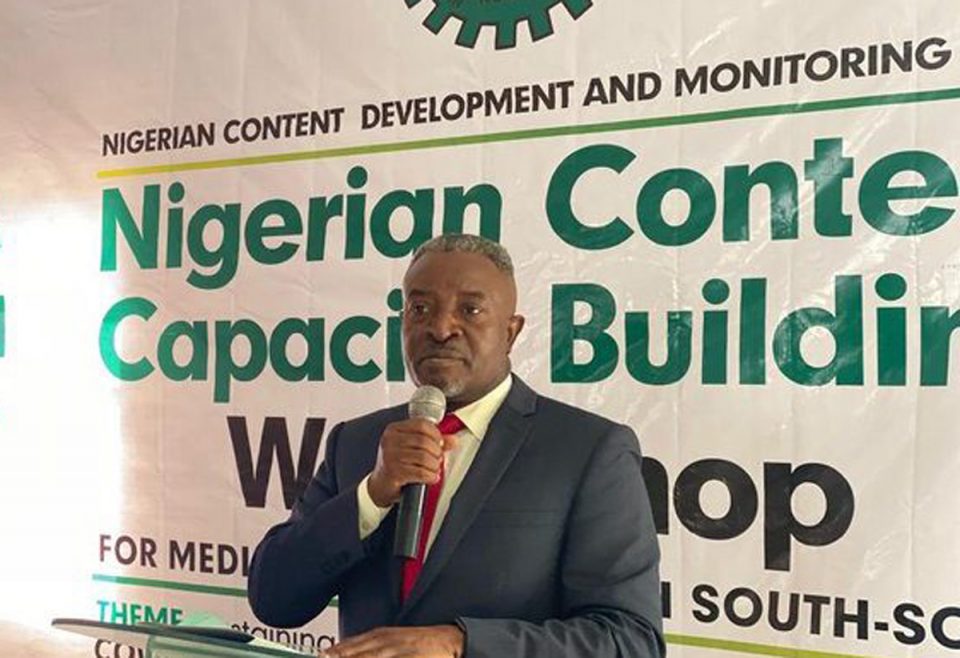The Nigerian Content Development and Monitoring Board (NCDMB) has tasked media practitioners to be awakened and sensitive to their Agenda Setting Role and changes in the context of emerging developments in the energy landscape.
The board also urged media practitioners to imbibe proactive promotion of local content agenda and whistle blowing role by exposing non-compliance activities by players in the industry through investigative journalism.
Dr Ginah Ginah, General Manager, Corporate Communications/Zonal Coordination, NCDMB, made the call at its 2021 Capacity Building Workshop for Journalists on Thursday in Abuja.
The workshop has its theme as “Sustaining Nigerian Content amidst Shifting Energy Landscape: The Role of the Media”.
In a remark, Ginah noted that media role should go beyond the traditional role of promoting Nigerian Content activities and sensitising the public to the imperative of Local Content to national development through investigative journalism.
Speaking on the theme of the 2021 workshop, he explained that it was chosen to draw attention to the board’s activities in sustaining Nigerian content growth in spite of the rapid changes in the Energy Landscape.
“Energy Transition refers to the global push or advocacy move away from fossil-based systems of energy production and consumption — including oil, natural gas and coal — to renewable energy sources like wind, solar and lithium-ion batteries.
“Energy transition is not a recent phenomenon as it has been an ongoing occurrence for centuries. The usual trigger being the need to utilise energy that is efficient, effective, and economic,” he said.
He said the International Energy Agency (IEA) had predicted that Global oil demand would flatten out in the coming two decades.
He added that the forecast was that oil demand could peak by the early 2020s and fall by a third to 66 million barrel per day in 2040, with road transport responsible for over 60 per cent of the reduction.
He further noted that the projection portended grave danger for the Nigerian economy which depended on revenues from oil and gas sales for sustenance.
Ginah stated that few other projections by the International Energy Forum and the Organisation of Petroleum Exporting Countries (OPEC) had insisted that fossil fuels would retain at least 50 per cent of the global energy mix in the next three decades.
According to Ginah the NCDMB believes strongly that the world will witness energy mix or redistribution rather than an outright swap of fossil fuels to renewable energies but the most important thing is how to react to these emerging developments.
He reiterated NCDMB commitment in aligning itself completely with the declaration by President Muhammadu Buhari and Minister of State for Petroleum Resources Chief Timipre Sylva that Gas was Nigeria’s Transition Energy.
He noted that it was in this regard that the President declared a Decade of Gas to reinforce Nigeria’s aspiration to leverage on its gas resources estimated at 206 trillion Cubic Feet to develop our national industrial, commercial and agricultural base.
In its efforts to operationalise this declaration, he said, NCDMB made several interventions in the gas value-chain which spanned the development of Liquefied Petroleum Gas (LPG) storage terminals and jetties, inland gas processing to produce gas and propane, infrastructure for gas gathering.
Others according to him are injection into gas pipeline networks, CNG facilities, and manufacturing of composite LPG cylinders.
He disclosed that other planned investments with the company in LPG storage and bottling plants would come up in Abuja, Kano, Kaduna and Bauchi States while six depots would be in Zamfara, Jigawa, Gombe, Plateau, Niger and Nasarawa states.
The general manager noted that from the inception of the NCDMB in 2010, it identified the media as one of the most important stakeholders in its implementation of the Nigerian Oil and Gas Industry Content Development Act (NOGICD Act).
He explained that the board was getting involved in developing commercial oil and gas projects being a regulatory agency because of section 70(h) of the NOGICD Act 2010.
He further stated that the section mandated the Board to assist local contractors and Nigerian companies to develop their capabilities and capacities to further the attainment of the goal of developing Nigerian Content in the Nigerian oil and gas industry.
In a presentation, Mr Umah Babangida, Director, Legal Services, NCDMB, highlighted the importance of regulations and guidance in deepening Nigeria local content implementation.
Babangida disclosed that the NOGICD act has 107 sections while section 68 states regulations on compliance and enforcement of the act.
According to him, major offences are punishable under this section which includes failure to submit Nigerian content plan or to obtain authorisation certificate, failure to give exclusive consideration to Nigerians and comply with minimal Nigerian content.
He maintained that non-compliance with the regulations by companies could attract maximum penalty or administrative




